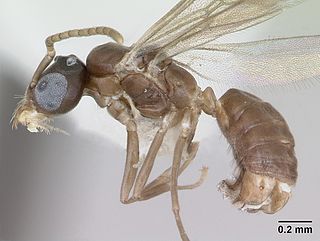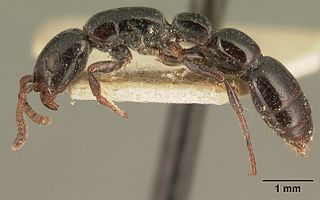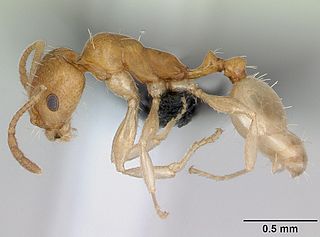
Adetomyrma is a genus of ants endemic to Madagascar. Workers of this genus are blind. The type species Adetomyrma venatrix was described in 1994, with the genus being an atypical member of its tribe, the Amblyoponini. This tribe includes the Dracula ants, members of which can feed on the hemolymph of larvae and pupae.

Paratrechina is one of seven ant genera in the Prenolepis genus-group from the subfamily Formicinae. Six species are included in Paratrechina; one of which, the longhorn crazy ant, is a widespread, pantropical pest.

Feroponera is a monotypic Afrotropical genus of ants in the subfamily Ponerinae containing the single species Feroponera ferox. The genus is known only from a few specimens collected from an unoccupied termitary in Cameroon.

Aptinoma mangabe is a species of ant in the subfamily Dolichoderinae. The species is known only from Antongil Bay, Madagascar.

Aptinoma antongil is a species of ant in the subfamily Dolichoderinae. The species is known only from Antongil Bay, Madagascar.

Eutetramorium is a small genus of ants within the subfamily Myrmicinae. To date it contains three species found in Madagascar and Comoros.

Mystrium is a rare genus of ants in the subfamily Amblyoponinae. First described by Roger (1862) with the description of the queen of M. mysticum, the genus contains 14 species, all of which occur in the rainforests of the Old World with over half of the species endemic to the Malagasy region.

Vicinopone is a monotypic Afrotropical genus of arboreal ants in the subfamily Dorylinae. Vicinopone conciliatrix, the only species in the genus, was first described as Simopone conciliatrix by Brown in 1975 and was transferred to its own genus by Bolton & Fisher in 2012. V. conciliatrix appears to be quite widely distributed but rare. Its rarity is more likely apparent than real because it nests and forages in trees, rarely if ever coming down to the ground.
Tanipone is a Malagasy genus of ants in the subfamily Dorylinae.

Simopone is a genus of predominantly arboreal ants in the subfamily Dorylinae. The genus is widely distributed in the Old World tropics, with the majority of species in Madagascar and sub-Saharan Africa.

Meranoplus is an Old World genus of ants in the subfamily Myrmicinae. With over 80 valid species, it is predicted that over half of the Meranoplus diversity remains undescribed, most of these from Australia.

Boloponera is a genus of small ants in the subfamily Ponerinae. The genus contains the single species Boloponera vicans, known from a single worker specimen collected in leaf litter in the Central African Republic. It is sometimes referred to as Bry's ant after its discoverer, Brian Fisher.

Promyopias is an Afrotropical genus of ant in the subfamily Ponerinae containing the single species Promyopias silvestrii. The rare genus has previously been regarded as a separate genus, as a subgenus and as a provisional synonymy, but was reinstated at genus-rank in 2008.

Ravavy is a Malagasy genus of ant in the subfamily Dolichoderinae containing the single species Ravavy miafina.

Myrmisaraka is a Malagasy genus of ants in the subfamily Myrmicinae. Described in 2014, the genus contains two species.
Malagidris is a Malagasy genus of ants in the subfamily Myrmicinae. Described in 2014, the genus contains six species.

Vitsika is a Malagasy genus of ants in the subfamily Myrmicinae. Described in 2014, the genus contains 14 species.

Royidris is a Malagasy genus of ants in the subfamily Myrmicinae. Described in 2014, the genus contains 15 species endemic to Madagascar.
















